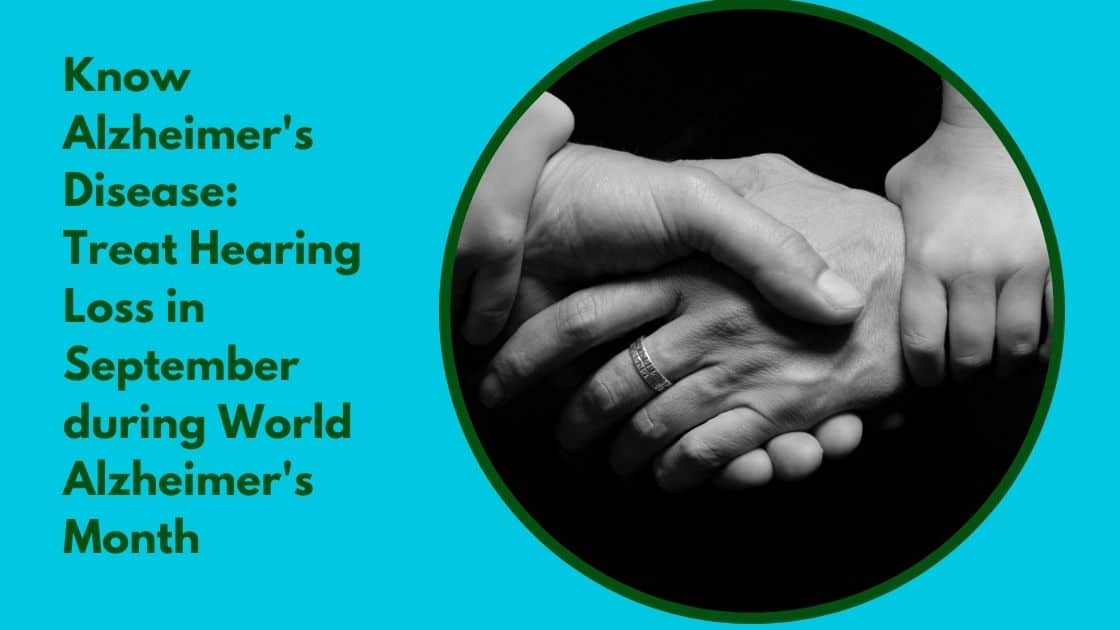
This month is World Alzheimer’s Month, a campaign to raise awareness globally on the condition. The most common form of dementia today, Alzheimer’s disease, deteriorates people’s memory, cognition, and behavior patterns over time. Even though Alzheimer’s disease is incurable, several drugs and therapies are currently being used to slow the progression and consequences of the condition.
According to research, hearing loss has been linked to an increased risk of Alzheimer’s disease in the last decade. In 2011, a team from John Hopkins University analyzed data from the Baltimore Longitudinal Study on Aging and discovered that people with hearing loss have a significantly higher risk of developing Alzheimer’s disease as they get older. Since the study’s publication, it has been suggested that the way hearing loss affects our cognitive performance may be partly to blame for the link.
A study finds a link between hearing loss and Alzheimer’s Disease
The John Hopkins study, conducted by Dr. Frank Lin, drew on a database of over 600 people who had their hearing and cognitive health assessed over 20 years. From 1990 to 2008, wellness statistics were tracked in a community with a 25% incidence of hearing loss and no incidences of dementia. In 2008, the number of cases of dementia had risen to 58. When statistics were compared, it was shown that people with hearing loss were far more likely to develop dementia.
The severity of hearing loss was similarly related to the degree of vulnerability to Alzheimer’s. Mild hearing loss puts a person at twice the chance of dementia, while a severe hearing loss puts them at a 500% higher risk than people who have normal hearing. The link between impaired hearing and dementia remained significant after accounting for other well-known health conditions that raise the likelihood of cognitive declines, such as diabetes and aging.
The effect of hearing loss on cognition
Much research has been done in the years since the John Hopkins researchers’ findings were published to better understand the role of hearing loss in developing Alzheimer’s disease and other forms of dementia. Researchers have found that part of the problem could be related to the mental strain that hearing loss can cause.
The finely tuned hearing processes of the ear are combined with an auditory nerve that sends messages to the brain for interpretation. In the brain’s auditory cortex, our cognitive abilities aid in the translation of sound into meaning. When our hearing is compromised, the auditory nerve sends us jumbled information. The brain scrambles to employ sound and context signals to fill in the missing gaps in sound transmission. As a result, finding meaning in sound fragments becomes a flawed and stressful process. Hearing loss eventually reshapes the auditory nerve pathways as well as the auditory cortex’s cognition strategies.
Extra energy is required to compensate for hearing loss, particularly in the brain. Our minds require additional cognitive resources to make sense of challenging, fragmentary sound transmissions sent by the inner ear. We neglect other cognitive tasks, such as balance and coordination, by allocating more energy to hearing. The redistribution of cognitive resources causes stress on the overall system, leading to the development of dementia in the long run.
Prevention is better than a cure
Another disturbing connection between hearing loss and dementia is that neither ailment has a treatment. There are, however, remedies available to help mitigate the negative consequences of each.
Understanding the extended track of cognitive deterioration over many years is essential for most new treatments being explored for dementia and Alzheimer’s disease. Alzheimer’s disease has a 14-year course of development, yet it generally goes unnoticed during the first decade. Treatment is already available to delay the emergence of severe Alzheimer’s symptoms if discovered early. Early detection of the disease is also critical for effective therapy, as it allows for treatment before permanent brain damage occurs.
As permanent damage to our hearing builds into significant losses, hearing loss likewise develops gradually. People require an average of 7 years to recognize hearing difficulties and seek help due to its gradual development. The sooner you get to care for a hearing problem, the more efficiently it can be addressed. Much hearing loss can be repaired with hearing aids, and the detrimental effects of lost hearing can be avoided or reduced.
Treating Hearing Loss
Because your hearing health is linked to your entire health in so many ways, it’s critical to diagnose and treat hearing disorders as soon as possible. It’s critical to seek help if your hearing begins to deteriorate. Our team can assist you in identifying hearing issues and finding solutions.
